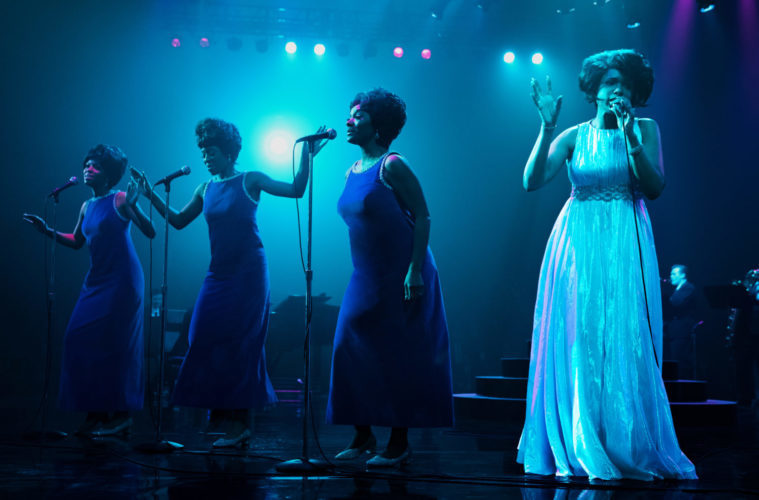Even cliches can be compelling when they’re portrayed with heart and reverence, and no movie in recent memory does this as well, and fittingly so, as Respect, the recently-released Aretha Franklin biopic. If you walk out of the theater (the only way you could see it up until today, as it just became available On Demand) and don’t feel exhilarated and basically in awe of the talent portrayed and the talent of the portrayals, you might want to have a doctor check you out.
This one has everything any film-goer or person with a pulse might need to be entertained in terms of acting, singing, costuming, and production. And then there’s the story arc, filled with highs and lows, loss and growth, activism and spirituality, validation and redemption. Her story might be brimming with familiar cinematic tropes, but it was all true, and it produced a legend.
Franklin knew what she was doing picking Jennifer Hudson to play her before she died. As she did in Dreamgirls, Hudson lights up the screen no matter the scene, and while that’s clearly easy when she’s decked out in fabulous frocks crooning her guts out on stage, it’s a bit more challenging during the less glitzy moments, which concede and characterize a lot of what fans already knew about the star, but probably don’t think about too much, especially while listening to “Respect” or “Freedom.”
After losing her beloved mother at age 10, Aretha had her first two sons at 12 and 14 years of age. She allowed herself to be controlled in her youth, first by her domineering preacher father, then by an abusive husband, then by record execs. After trying hard to score hits with soulful covers of white standards, she finally stood up for herself and her musical dreams and ideas, only to battle alcoholism and depression after she’d made it, taking on too much and letting those around her (including her sisters, who were also her backup singers) down in the process.
If you caught the National Geographic bio-series Genius: Aretha, this film begins the same way – with a child getting dragged out of bed by her dad (played to perfection by Forrest Whitaker) to entertain a rollicking house party full of entertainment types including Dinah Washington (a tantalizing and ‘tude-ish take by Mary J. Blidge). Skye Dakota Turner plays Aretha as a kid and her scenes are as powerful (if not exactly pleasant) as the latter ones with Hudson. Though her childhood trauma appears to be glossed over early on, director Liesl Tommy comes back to illuminate some of the darker stuff, which ultimately informs the singer’s actions (and non-actions) later on.
The music is so good in Respect (there are full renditions of a handful of Aretha’s best numbers and we dare you not to sing along in the theater), it almost wouldn’t have mattered how good the acting was. But Hudson mixes just the right amounts of diva and despair in her portrayal, which is less an impersonation and more of channeling of spirit.
The one misstep here was the casting of Marlon Wayans as her husband Ted White. We wanted to see this stretch for him be a success, but the role required a menacing depth that he was never able to achieve. The comic actor’s presence was a real distraction, and whether it’s because he’s done too many popular movie parodies or just doesn’t have the chops is still unclear. Either way, we imagined a handful of other actors who could’ve done the debonair but destructive dude better – from Michael B. Jordan to Wayans’ old In Living Colour comrade Jaime Foxx – and we were glad when Aretha finally gave him the boot for more reasons than one.
Speaking of Foxx, his rendition of Ray Charles in Ray is considered the gold standard in biopics and particularly Black biopics. Last year’s The United States vs. Billie Holiday starring Andra Day should probably be added to this list, and so should Respect, which might not be as arty, but is definitely more enjoyable in general.
Hudson’s approach to the music is key to the film’s success. Melding her own vocal style with Re-Re’s (Aretha’s nickname) she’s consistently authentic when she’s singing and vibing. She comes off vulnerable yet regal, especially in pivotal scenes with musicians jamming and recording at Muscle Shoals and with her sisters. In these moments, Respect transcends the typical music icon trajectory for something more intimate, conveying creativity, complexity and (super)-natural talent of the woman who made us all feel so good inside.
Advertising disclosure: We may receive compensation for some of the links in our stories. Thank you for supporting Irvine Weekly and our advertisers.

